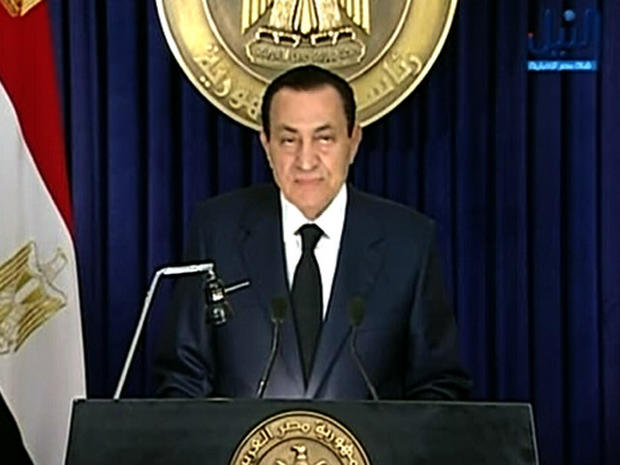Calls for Mubarak Ouster Split Israel Backers
While many Americans have cheered the efforts of protesters attempting to end the 30-year reign of Egyptian president Hosni Mubarak, some supporters of Israel are sounding alarm about the prospect of his downfall - and expressing frustration that some of their usual allies are siding with the protesters.
The concern for Israel is that Islamist militants could step into the void filled by Mubarak's ouster and decide to no longer honor the 1979 peace agreement between the two countries.
"In a state of chaos, an organized Islamic group can take over a country. It has happened. It happened in Iran," Israeli Prime Minister Benjamin Netanyahu said Monday. "A takeover of oppressive regimes of extreme Islam violates human rights, grinds them to dust ... and in parallel also pose a terrible danger to peace and stability."
On Wednesday, Netanyahu called on the international community to do what is necessary to protect the accord. "We expect any government of Egypt to honor the peace," he said. "Moreover, we expect the international community to expect any government of Egypt to honor the peace."
As Politico reports, some vocal supporters of Israel seen as neoconservatives - among them Weekly Standard Editor Bill Kristol, Bush National Security Council official Elliott Abrams, and scholar Robert Kagan - are backing the ouster of the Egyptian president despite Israeli concerns.
Kagan told the New York Times that "[t]here's no way for us to go through the long evolution of history without allowing Islamists to participate in democratic society."
Complete Coverage: Anger in the Arab World
"What are we going to do -- support dictators for the rest of eternity because we don't want Islamists taking their share of some political system in the Middle East? We've got to put our money where our mouth is," he said.
The Egypt question has exposed a fault line between neoconservatives, who generally believe in the benevolent force of democracy, and Israel backers concerned about what democracy might bring. Hawkish Israel scholar Barry Rubin, who falls in the latter camp, views the neoconservative position as naive, arguing that it reflects efforts "impose their fantasy model on the real Middle East."
Former U.N Ambassador John Bolton told Politico he was concerned about signals from the White House that it wants to see Mubarak exit the stage sooner rather than later.
"I think you've got to be humble and prudent in what you do here," he said. "... If that thing collapses, the rock of stability in the region could easily come unstuck. Once that happens, it's hard to predict the consequences."
Liberal businessman George Soros dismisses such concerns as reflecting "the old conventional wisdom about the Middle East," arguing such views "need to be changed, lest Washington incorrectly put up resistance to or hesitate in supporting transition in Egypt." And he says "the main stumbling block" to America taking a strong stand for democracy is Israel.
"In reality, Israel has as much to gain from the spread of democracy in the Middle East as the United States has," Soros writes in the Washington Post. "But Israel is unlikely to recognize its own best interests because the change is too sudden and carries too many risks. And some U.S. supporters of Israel are more rigid and ideological than Israelis themselves."

